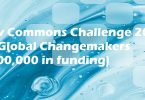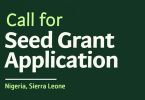Call For Applications: Climate Change AI Innovation Grants 2024 (Up to $150,000)
Climate Change AI is a nonprofit initiative to catalyze impactful work at the intersection of climate change and machine learning. Since it was founded in 2019, CCAI has inspired, informed, and connected thousands of individuals from across academia, industry, and the public sectors, through its foundational reports on AI and climate change, networking and knowledge-sharing events, educational initiatives, and global grants programs.
With the support of Quadrature Climate Foundation, Google DeepMind, and Global Methane Hub, they are excited to announce funding of up to USD 1.4M for projects at the intersection of AI and climate change. They are also grateful to the Canada Hub of Future Earth for serving as the fiscal sponsor for this program.
Apply Also: Call for Application: Creative Hobart Medium Grants – Australia
Tracks
Main Track
Projects in the Main Track should leverage AI or machine learning to address problems in climate change mitigation, adaptation, or climate science, or consider problems related to impact assessment and governance at the intersection of climate change and machine learning.
Relevant topics include but are not limited to the following topics:
- ML to aid mitigation approaches in relevant sectors such as agriculture, buildings and cities, heavy industry and manufacturing, power and energy systems, waste, transportation, or forestry and other land use.
- ML applied to societal adaptation to climate change, including disaster prediction, management, and relief in relevant sectors.
- ML for climate and Earth science, ecosystems, and natural systems as relevant to mitigation and adaptation.
- ML for R&D of low-carbon technologies such as electrofuels and carbon capture & sequestration.
- ML approaches in behavioral and social science related to climate change, including those anchored in climate finance and economics, climate justice, and climate policy.
- Projects addressing AI governance in the context of climate change, or that aim to assess the greenhouse gas emissions impacts of AI or AI-driven applications, may also be eligible for funding. (Studies addressing this area may be exempt from the dataset publication requirement.)
Special Track on Methane
Submissions to the Special Track on Methane should leverage AI or machine learning to address problems in methane-related climate change mitigation in the short/medium term period (well before 2040), including (but not limited to) the areas of:
- Energy (including coal mine methane, ventilation air methane, flaring, methane leak detection, super-emitters, and methane emissions from oil and gas).
- Waste and circular economy (including food loss and waste recovery, food or organic waste separation, dumps/landfill emissions, wastewater treatment, and sludge management).
- Agriculture (including livestock, manure management, biomass burning, and rice cultivation).
Special Track on Dataset Gaps
- Submissions to the Special Track on Dataset Gaps should have, as their primary focus, the creation of a documented dataset (or simulator) by collating, labeling, and/or annotating existing data, and/or by collecting, simulating, or otherwise making available new data that can enable further research. Topics that may be addressed by the dataset or simulator follow the same scope as submissions to the Main Track, and applicants should highlight the particular gap in dataset availability that this project aims to address, and why this is important for climate change mitigation or adaptation.
- Proposals in the Special Track on Dataset Gaps may also request support from a Google DeepMind researcher, in addition to the financial award. Applicants who may be interested in taking advantage of this option will be asked to indicate this in the CMT submission form.
Eligibility
- Each application must have a Principal Investigator (PI) who is affiliated with an accredited university in one of the 38 OECD Member Countries (see list here). The PI must be eligible to hold grants under their name at their accredited university; this may include, e.g., faculty, postdocs, or research scientists (depending on the institution).
- Co-Investigators can be located outside OECD Member countries and can be affiliated with non-research institutions, and indeed multi-country and multi-sectoral collaborations are encouraged. However, co-investigators cannot be affiliated with an organization on the Consolidated Screening List) or an organization in a sanctioned country.
- Current members of the Climate Change AI Board of Directors and Climate Change AI staff cannot apply to this grant as a PI, and they may not receive funds towards their own salary. Program Chairs and Meta-Reviewers for this grant may not apply or receive funds in any way (however, Reviewers may, and conflicts of interest will be appropriately managed during the review process).
- They do not fund research activity that is currently funded by other grant programs. If other grant proposals for the same project have been submitted and/or are under consideration, the relation of the present proposal to those other proposals needs to be clearly explained. If the proposal is selected for funding, no aspect of a project should be double funded by other funding bodies.
Grants
- Up to USD 150K per proposal, for projects of 12 months in duration. They will award a total of up to USD 1.4M in grants across all projects.
Deadline: September 15, 2024






